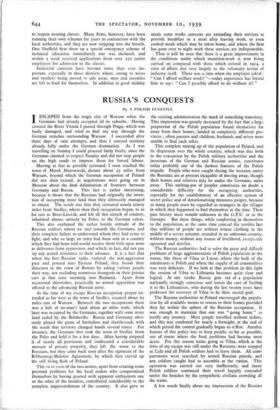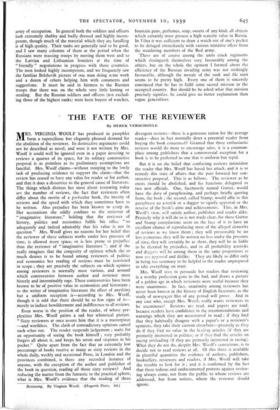RUSSIA'S CONQUESTS
By A POLISH FUGITIVE
IESCAPED from the tragic city of Warsaw when the Germans had already occupied all its suburbs. Having crossed the River Vistula I passed through Praga, which was badly damaged, and tried to find my way through the German trenches surrounding Warsaw. I succeeded after three days of vain attempts, and thus I entered territory already fully under the German domination. As I was travelling on Sunday I could proceed fairly freely, since the Germans claimed to respect Sunday and did not stop people on the high roads to impress them for forced labour.
Moving as fast as possible eastward, I soon reached the town of Minsk Mazowiecki, distant about 25 miles from Warsaw, beyond which the German occupation of Poland did not then extend, as negotiations were going on in Moscow about the final delimitation of frontiers between Germany and Russia. This fact is rather interesting, because it shows that the Russians had originally the inten- tion of occupying more land than they ultimately managed to obtain. The result was that they retreated nearly ninety miles from Siedlce, where then their occupation began, to as far east as Brest-Litovsk, and left all this stretch of country, inhabited almost entirely by Poles, to the German mien.
This also explained the rather hostile attitude of the Russian soldiers whom we met towards the Germans, and their complete failure to understand whom they had come to fight, and why so large an army had been sent to a country which they had been told would receive them with open arms as deliverers from oppression, and which, in fact, did not put up any armed resistance to their advance. It is a fact that when the first Russian tanks violated the non-aggression pact and poured into Eastern Poland, they found their direction to the town of Rowno by asking various people their way, not excluding numerous bourgeois in their private cars at that time steaming into Rumania. Apart from occasional skirmishes, practically no armed opposition was offered to the advancing Russian army.
At the time of my escape Russian occupation proper ex- tended as far west as the town of Siedlce, situated about 65 miles east of Warsaw. Between the two occupations there was a belt of no-man's land about 4o miles wide, which later was occupied by the Germans, together with some more land ceded by the Bolsheviks. Russia and Germany obvi- ously played the game of battledore and shuttle-cock, with the result that territory changed hands several times. For instance, the Germans first took the town of Siedlce from the Poles and held it for a few days. After having stripped it of nearly all provisions and confiscated a considerable amount of private property, they left the town to the Russians, but they came back soon after the signature of the Ribbentrop-Molotov Agreement, by which they carved up the still living flesh of Poland.
This va et vient of the two armies, apart from creating some personal problems for the local zealots who compromised themselves by having greeted with apparent enthusiasm one or the other of the invaders, contributed considerably to the complete impoverishment of the country. It also gave to the existing administration the mark of something transitory. This impression was greatly increased by the fact that a large proportion of the Polish population found themselves far away from their homes, landed in completely different pro- vinces ; often parents and children, husbands and wives were unable to find each other.
This complete mixing up of the population of Poland, and its dispersion over the whole country, which was due both to the evacuation by the Polish military authorities and the invasions of the German and Russian armies, constitutes today probably one of the darkest features of the Polish tragedy. People who were caught during the invasion under the Russians are at present incapable of moving away, though their homes and relatives may be under the Germans, miles away. This melting-pot of peoples constitutes no doubt a considerable difficulty for the occupying authorities, especially for the establishment of an effective system of secret police and of denationalising measures proper, because so many people must be regarded as strangers in the villages in which they happened to find themselves at the time. Their past history must remain unknown to the G.P.U. or to the Gestapo. But these things, while comforting in themselves to the population, at the same time conceal the terrible fact that millions of people are without winter clothing in the middle of a severe autumn, stranded in an unknown country, without money, without any source of livelihood, completely uprooted and derelict.
The Russian authorities had to solve the great and difficult problems of large agglomerations of Polish population in the towns, like those of Vilna or Lwow, where the bulk of the inhabitants is Polish and where the supply of all commodities was very deficient. If we look at that problem in this light the cession of Vilna to Lithuania. becomes quite clear and logical. At one stroke Russia gets rid of a population nationally strongly conscious and leaves the care of feeding it to the Lithuanians, who during the last twenty years have professed the recovery of Vilna to be their sacred goal.
The Russian authorities in Poland encouraged the popula- tion by all available means to return to their homes provided they lay within the sphere of the Russian occupation. It was enough to maintain that one was " going home " to justify any journey. Most people travelled without tickets, and this was condoned for nearly a fortnight, at the end of which period the control gradually began to stiffen. Another feature of this policy was to keep people, so far as possible, out of towns where the food problems had become most acute. For this reason trains going to Vilna, which at the time of my escape was still under the Russians, were stopped at Lida and all Polish soldiers had to leave them. All com- partments were searched by armed Russian patrols, and any soldiers caught had to assemble at the station. This operation was carried out very inefficiently, and many Polish soldiers continued their travel happily concealed under the benches by the sympathetic civilians crowding all the trains.
A few words finally about my impressions of the Russian army of occupation. In general both the soldiers and officers look extremely shabby and badly dressed and highly incom- petent, though much of the material which they are handling is of high quality. Their tanks are generally said to be good, and I saw many columns of them at the period when the Russians were massing troops by moving them west and to the Latvian and Lithuanian frontiers at the time of " friendly " negotiations in progress with those countries. The men looked highly incompetent, and we frequently saw the famliiar Bolshevik picture of one man doing same work and a dozen of others helping him with comments and suggestions. It must be said in fairness to the Russian troops that there was on the whole very little looting or stealing. But the Russian soldiers and officers (not exclud- ing those of the highest ranks) were keen buyers of watches, fountain pens, perfumes, soap, sweets of any kind, all objects which certainly must possess a high scarcity value in Russia. In Vilna it was sufficient to draw a watch out of one's pocket to be deluged immediately with various tentative offers from the wandering members of the Red army.
There are of course among the units crack regiments which distinguish themselves very favourably among the others, but on the whole the opinion I formed about the efficiency of the Russian invading army was not strikingly favourable, although the morale of the rank and file man seems to be pretty high. Every one of them is sincerely convinced that he has to fulfil some sacred mission in the occupied country. But should he be asked what that mission precisely signifies, he could give no better explanation than vague generalities.





































 Previous page
Previous page